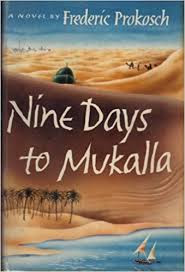Under Milk Wood, by Dylan Thomas. John & I are big fans of TCM (Turner Classic Movies). One evening we chanced upon a showing of Richard Burton's 1967 vanity production of Doctor Faustus, by Shakespeare-contemporary Christopher Marlowe. Mesmerized by Burton's oh-so-theatrical elocution, I sought out a recording of his 1954 BBC Radio performance of fellow Welshman Dylan Thomas' Under Milk Wood, an entrancing verse drama depicting a day in the life of Llareggub, a fictional fishing village in Wales. This book is a transcript of the radio play; with language energetic and provocative, the poet conveys the hopes and regrets of the village's colorful inhabitants. Although criticized in his time for stylistic extravagance and a whiskey-soaked persona, Dylan Thomas now ranks among the most popular of 20th century poets.
Nine Days to Mukalla, by Frederic Prokosch. I'm obsessed with Prokosch! This is the 3rd novel of his I've read in the past few months, and there awaits a 4th on the to-be-read shelf. Thank goodness for mail order. Written in 1953, it details yet another confrontation with harsh far-flung geographies and inscrutable cultures; two Brits and two Americans survive the emergency landing of their plane only to face ever-escalating dangers as they navigate the Arabian Peninsula in search of deliverance.
Nine Days to Mukalla, by Frederic Prokosch. I'm obsessed with Prokosch! This is the 3rd novel of his I've read in the past few months, and there awaits a 4th on the to-be-read shelf. Thank goodness for mail order. Written in 1953, it details yet another confrontation with harsh far-flung geographies and inscrutable cultures; two Brits and two Americans survive the emergency landing of their plane only to face ever-escalating dangers as they navigate the Arabian Peninsula in search of deliverance.
Three Tales, by Gustave Flaubert. I acquired this little gem when Aardvark Books on Church St. in San Francisco sadly shut down early last year after 40 years in business. What a glorious used book emporium it was; I have yet to encounter a comparable 2nd hand establishment here in London. Flaubert, the revered French novelist best known for Madame Bovary (1857), was a perfectionist, and this esteemed collection of 3 short stories (A Simple Heart, The Legend of Saint Julian the Hospitalier, and Herodias) is indeed perfect! Apparently, Flaubert's Herodias, a retelling of the beheading of John the Baptist, inspired Oscar Wilde to write the scandalous 1891 play, Salome. Al Pacino's appearance at the screening of filmed rehearsals of his production of Wilde's Salome was a memorable evening for us at The Castro Theatre in 2011.
Justine, by Lawrence Durrell. Perhaps some measure of fame comes to this author as the eldest son in the PBS TV series The Durrells in Corfu, which dramatizes the family's audacious relocation from England to Greece in 1935, but it is The Alexandria Quartet (Justine, Balthazar, Mountolive, and Clea), first published in the late 1950's, that cements Durrell's status as a literary luminary. With luscious serpentine prose, pre-war Alexandria in Egypt springs to sensuous life in this narrative of Justine, an exotic Jewess, and the romantic and political entanglements of those in her circle; each volume in the quartet essentially depicts the same events, but from different perspectives. It almost earned the Nobel Prize in Literature for Durrell in 1962, but he lost out to John Steinbeck.
The Epic of Gilgamesh, author unknown. Miraculously surviving from the darkest recesses of the past, the world's oldest piece of literature is carved upon broken clay tablets originating in 2100 BC Babylon, a mid-19th century discovery within the ruins of an ancient library in northern Iraq. The carvings weave the tale of Gilgamesh, King of Uruk, 3rd Dynasty of Ur, and his friend Enkidu, wild man of the forest primeval; joining forces they set out to slay the monstrous giant Humbaba! Thankfully, I didn't need to puzzle over the clay fragments and their cuneiform script; the version I read is an accessible English translation that is actually quite diverting. Interestingly, the epic includes an eerily familiar description of a great flood, a story which 1,500 years later found its way into the Bible's Book of Genesis.





No comments:
Post a Comment